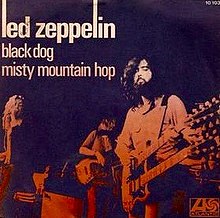Misty Mountain Hop
| "Misty Mountain Hop" | ||||
|---|---|---|---|---|
 French single picture sleeve | ||||
| Single by Led Zeppelin | ||||
| from the album Led Zeppelin IV | ||||
| A-side | "Black Dog" | |||
| Released | 2 December 1971 (US) | |||
| Recorded | 1971 | |||
| Studio | Headley Grange, Hampshire, England | |||
| Genre | Hard rock[1] | |||
| Length | 4:39 | |||
| Label | Atlantic | |||
| Songwriter(s) | ||||
| Producer(s) | Jimmy Page | |||
| Led Zeppelin singles chronology | ||||
| ||||
"Misty Mountain Hop" is a song from English rock band Led Zeppelin's untitled fourth album, released in 1971. The song was released as the B-side to the single "Black Dog" and performed in most of the band's 1972 and 1973 concert tours.
Background
The most common interpretation of the song's title involves a reference to the Misty Mountains in J. R. R. Tolkien's The Hobbit. The lyrics refer to the events of the 7 July 1968 "Legalise Pot Rally" in Hyde Park, London, in which police made arrests for marijuana possession.[2] The lyrics reflect Plant's quest for a better society, a place and time when hangups are replaced with individual freedom and a life of mutual support and rapport.[3]
Recording
The song was recorded at Headley Grange, a mansion where the band sometimes lived in Hampshire, England.[4]
Releases and versions
The song was released as the B-side to the single "Black Dog",[5] which was released in the United States on 2 December 1971,[6] continental Europe (the United Kingdom did not receive the single release),[5] and Australia.[5]
A different version of this song is featured on the second disc of the remastered two CD deluxe edition of Led Zeppelin IV.[7]
Live performances
The band performed the song at the 3 May 1971 Copenhagen concert (song's first concert performance) and then at the 1972 and 1973 concert tours. Band member Robert Plant performed it for most of his own solo concerts since the 1980 band breakup. Plant also performed it with the surviving members of the band at the 10 December 2007 tribute concert for Ahmet Ertegun.[8]
Cover versions
References
- ^ Schuman, Michael A. (2009). Led Zeppelin: Legendary Rock Band. Enslow Publishers. ISBN 978-0-7660-3026-8.
The fourth album also has its share of hard rock tracks. Three that received a lot of radio airplay are "Black Dog," "Misty Mountain Hop," and the appropriately named "Rock and Roll."
- ^ Williamson, Nigel (2007). The Rough Guide to Led Zeppelin. London: Rough Guides. p. 230. ISBN 978-1-8435-3841-7.
- ^ Fyfe, Andy (2003). When the Levee Breaks: The Making of Led Zeppelin IV. London: Unanimous. p. 128. ISBN 978-1-903318-56-0.
- ^ Lewis, Dave (1994). The Complete Guide to the Music of Led Zeppelin. Omnibus Press. ISBN 0-7119-3528-9.
- ^ a b c Guesdon, Jean-Michel; Margotin, Philippe (2018). "Led Zeppelin IV". Led Zeppelin: All the Songs – the Story Behind Every Track. Translated by Richard George Elliot; Jackie Smith. Perseus Books. p. 246. ISBN 978-0-316-44867-3. LCCN 2018942472.
- ^ Bream, Jon (2008). "Discography". Whole Lotta Led Zeppelin (1st ed.). MBI Publishing. p. 273. ISBN 978-0-7603-3507-9. LCCN 2008023139.
- ^ "Led Zeppelin Releases Remastered Sets for "IV" and "Houses of the Holy"". No Treble. 28 October 2014. Retrieved 27 January 2015.
- ^ Guedson & Margotin 2018, pp. 275–276.
